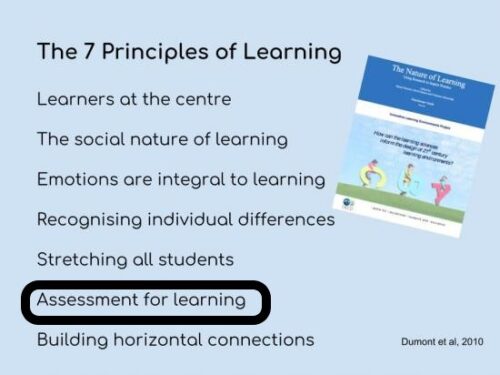Assessment for learning – essential for the modern learning environment
By Margaret Hesketh on October 18, 2018 in Assessment for learning
I am the new kid on the block at Evaluation Associates | Te Huinga Kākākura Mātauranga.
I’m writing this in my ninth week as a PLD facilitator after being a deputy principal at a primary school for 14 plus years. In these few weeks I have had the absolute privilege of watching skilled facilitators in action, working with some amazing teachers, and have had the chance to catch up on reading that is next to impossible to do when one is busy in a school juggling the multiple demands of a teacher/leader.
In 2003 I was introduced to a way of being as a teacher that made a great deal of sense to me. As I learnt about and practised the strategies involved, learning for my students became more meaningful and enjoyable. Students who were disengaged began to show increased progress in their skills and understanding. In fact, it would be safe to say that this way of being as an educator has had a huge impact on my teaching practice. It influenced how my colleagues and I talked about teaching and learning and the decisions we made in our classrooms. What is this way of being? Assessment for learning (AfL).
In the noughties, professional development for AfL was delivered throughout New Zealand and “Clarity in the Classroom” by Michael Absolum was first published in 2006. Thirteen years later, to my dismay, I have heard comments from educators that schools have ‘done’ AfL so why re-visit it? I firmly believe that AfL is still a powerful capability for improving student learning.
At present, New Zealand schools are at varying stages of providing innovative learning environments (ILEs) that cater for 21st century Learners. After reading a plethora of literature and listening to educational leaders who have spent a number of years developing ILEs already, the common thread is the need to establish a sound and shared understanding of the pedagogy required for 21st century learners.
There are a huge number of different educational researchers, consultants and practitioners who have written and/or spoken about how 21st Century learners learn most effectively and the teaching practices that optimise their ability to learn: Michael Absolum, Adrienne Alton-Lee, Shirley Clarke, Guy Claxton, Bek Galloway, John Hattie, Kath Murdoch, Mark Osborne, John Spencer and A.J. Juliani, Dylan William to name just a very few! Although different words are used, the resounding message is that if we, as educators, wish for our students to become life-long learners we need to create conditions where our learners need to ‘own’ the learning process and what is learnt (Absolum, 2006). How is this done? Through having an assessment for learning mind-set.
In my first few weeks of working at Evaluation Associates | Te Huinga Kākākura Mātauranga I read “Clarity in the Classroom” (Absolum, 2006) from cover to cover for the first time. (Previously, I had dipped in and out to find relevant information.) As I read, I constantly made connections with many of the people I referred to earlier, along with Carol Dweck’s work on Growth Mindsets. AfL is not just a passing fad (p. 29, Booth, Dixon & Hill, 2015), it is one of seven key principles of learning for the design of 21st Century learning environments (OECD, 2010).

Yes, AfL was first introduced almost 20 years ago. However, the theory of it is based on a large amount of research investigating the optimum teaching approaches that engage all learners thus increasing achievement. The principles of AfL have withstood the test of time and it is sensible for us as educators to review our teaching through an AfL lens. It is a vital ingredient to establishing and maintaining innovative learning environments and most importantly, a way of being for the teacher that maximises student learning and achievement when done effectively. Is it being used as effectively as it possibly can be in our schools?
Contact Margaret to learn more
Other articles you might like
A few years ago I visited a school for the first time and a teacher asked what my job was. I told her that I was a facilitator and a lot of my work in schools was supporting teachers and students with assessment for learning. “Ugh… assessment,’ she replied. “If they would just let us get on with teaching!” It was a wonderfully honest response, which demonstrated to me how assessment can start to be viewed as a required task which sits separately to teaching and learning, rather than the bridge between teaching and learning.
“You don’t have to be frightened about learning. You just have to be prepared to ask lots of questions . . . to find out what you don’t know. I like helping the others too . . .” Derek – Year 6 ‘priority learner’
Empowering students to lead their own learning … online
